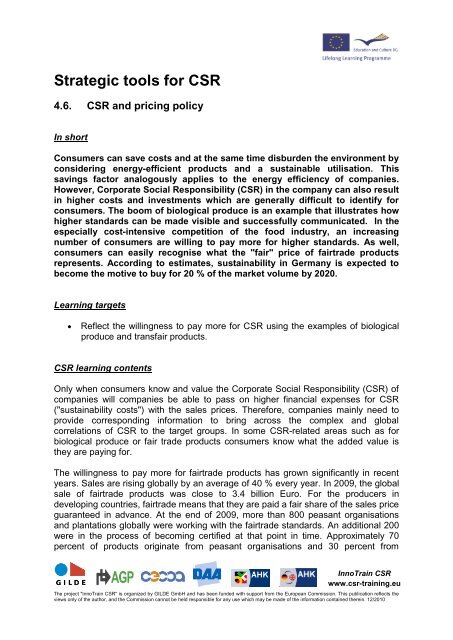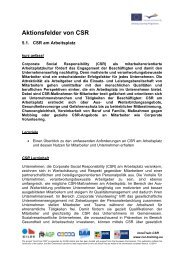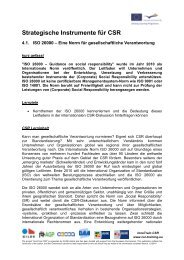What is Corporate Social Responsibility? - InnoTrain CSR
What is Corporate Social Responsibility? - InnoTrain CSR
What is Corporate Social Responsibility? - InnoTrain CSR
Create successful ePaper yourself
Turn your PDF publications into a flip-book with our unique Google optimized e-Paper software.
Strategic tools for <strong>CSR</strong><br />
4.6. <strong>CSR</strong> and pricing policy<br />
In short<br />
Consumers can save costs and at the same time d<strong>is</strong>burden the environment by<br />
considering energy-efficient products and a sustainable util<strong>is</strong>ation. Th<strong>is</strong><br />
savings factor analogously applies to the energy efficiency of companies.<br />
However, <strong>Corporate</strong> <strong>Social</strong> <strong>Responsibility</strong> (<strong>CSR</strong>) in the company can also result<br />
in higher costs and investments which are generally difficult to identify for<br />
consumers. The boom of biological produce <strong>is</strong> an example that illustrates how<br />
higher standards can be made v<strong>is</strong>ible and successfully communicated. In the<br />
especially cost-intensive competition of the food industry, an increasing<br />
number of consumers are willing to pay more for higher standards. As well,<br />
consumers can easily recogn<strong>is</strong>e what the "fair" price of fairtrade products<br />
represents. According to estimates, sustainability in Germany <strong>is</strong> expected to<br />
become the motive to buy for 20 % of the market volume by 2020.<br />
Learning targets<br />
� Reflect the willingness to pay more for <strong>CSR</strong> using the examples of biological<br />
produce and transfair products.<br />
<strong>CSR</strong> learning contents<br />
Only when consumers know and value the <strong>Corporate</strong> <strong>Social</strong> <strong>Responsibility</strong> (<strong>CSR</strong>) of<br />
companies will companies be able to pass on higher financial expenses for <strong>CSR</strong><br />
("sustainability costs") with the sales prices. Therefore, companies mainly need to<br />
provide corresponding information to bring across the complex and global<br />
correlations of <strong>CSR</strong> to the target groups. In some <strong>CSR</strong>-related areas such as for<br />
biological produce or fair trade products consumers know what the added value <strong>is</strong><br />
they are paying for.<br />
The willingness to pay more for fairtrade products has grown significantly in recent<br />
years. Sales are r<strong>is</strong>ing globally by an average of 40 % every year. In 2009, the global<br />
sale of fairtrade products was close to 3.4 billion Euro. For the producers in<br />
developing countries, fairtrade means that they are paid a fair share of the sales price<br />
guaranteed in advance. At the end of 2009, more than 800 peasant organ<strong>is</strong>ations<br />
and plantations globally were working with the fairtrade standards. An additional 200<br />
were in the process of becoming certified at that point in time. Approximately 70<br />
percent of products originate from peasant organ<strong>is</strong>ations and 30 percent from<br />
The project "<strong>InnoTrain</strong> <strong>CSR</strong>" <strong>is</strong> organized by GILDE GmbH and has been funded with support from the European Comm<strong>is</strong>sion. Th<strong>is</strong> publication reflects the<br />
views only of the author, and the Comm<strong>is</strong>sion cannot be held responsible for any use which may be made of the information contained therein. 12/2010<br />
,<br />
<strong>InnoTrain</strong> <strong>CSR</strong><br />
www.csr-training.eu





